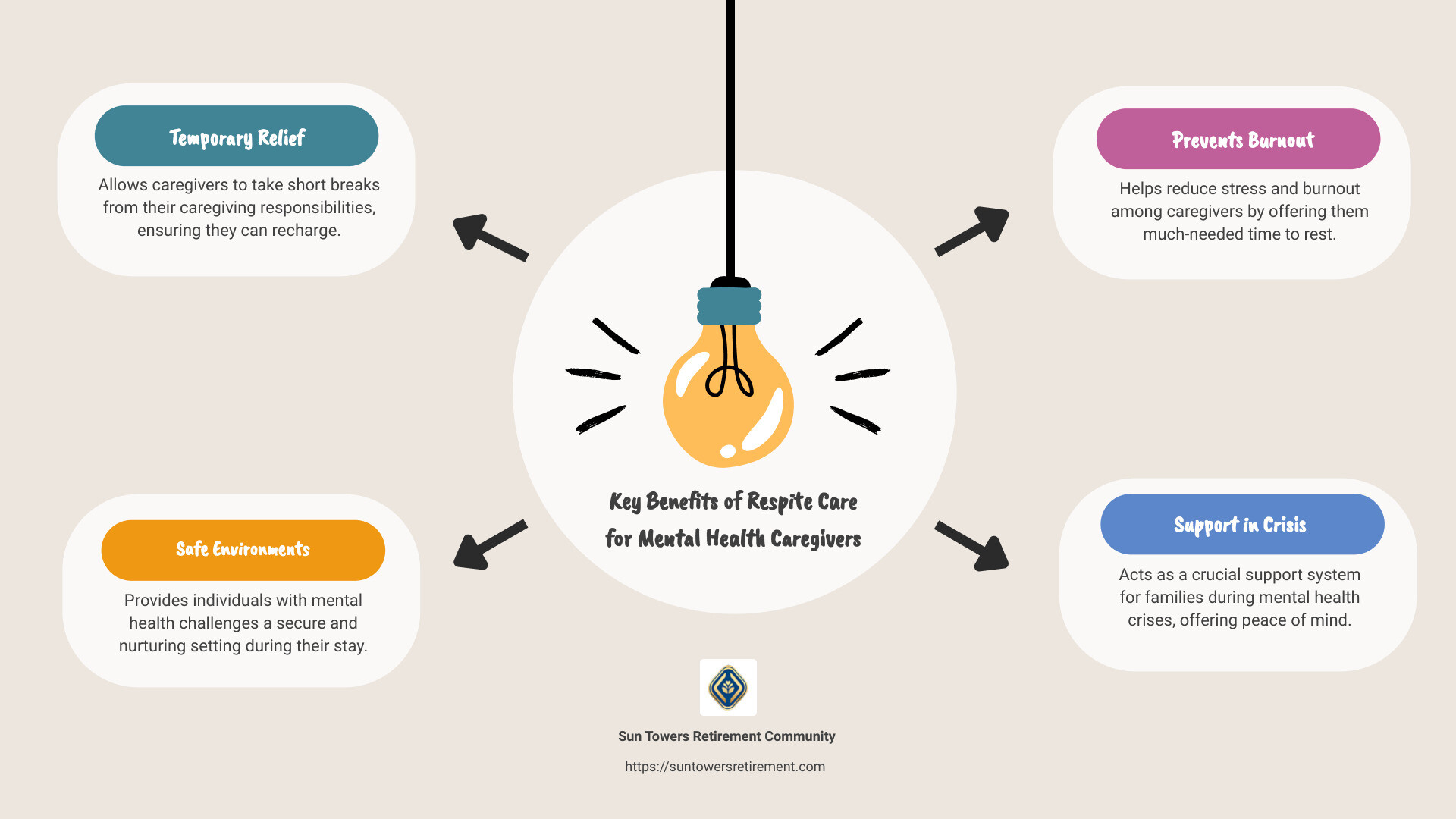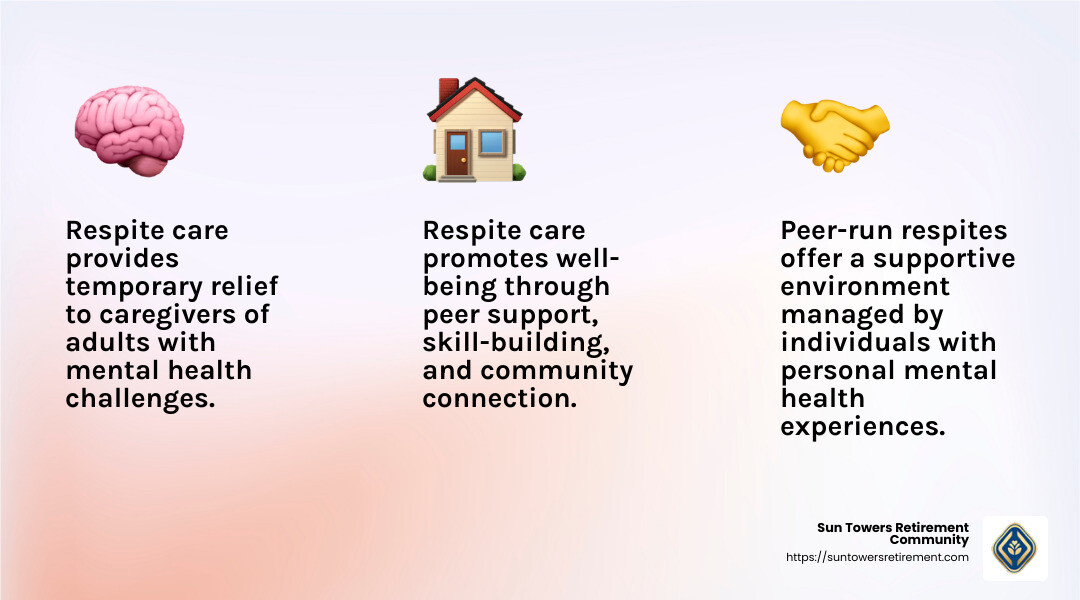Respite Care for Adults with Mental Health: 3 Essential Benefits
Respite care for adults with mental health offers crucial support to caregivers who often struggle with stress and burnout. For those caring for individuals between 18 and 60 with mental health challenges, finding moments of relief is essential. This type of care provides short-term relief by allowing caregivers to take breaks, knowing that their loved ones are in a safe and nurturing environment.
Highlights of respite care for adults with mental health:
– Provides temporary relief for caregivers
– Offers safe, caring environments for individuals in need
– Helps prevent caregiver burnout and stress
Mental health crisis can lead families into a high-stakes balancing act, where caregivers must juggle their own well-being while attending to their loved ones’ needs. Programs like peer-run respite facilities offer a lifeline, giving caregivers peace of mind. As Aimee Quicke, a beneficiary of such a program, put it, these facilities offer breakthroughs and coping skills, often serving as an “emotional bed-and-breakfast.”
By offering support and relief, respite care plays a vital role in addressing the ongoing national mental health crisis.
Understanding Respite Care for Adults with Mental Health
Respite care is a service designed to provide temporary relief to family caregivers. When it comes to respite care for adults with mental health, it offers a much-needed break for those caring for individuals aged 18 to 60 facing mental health challenges. This service ensures that caregivers can recharge, knowing their loved ones are in safe hands.
What is Mental Health Respite?
Mental health respite is specialized care custom to individuals with mental health disorders. It offers a structured environment where they can receive support and care while their primary caregivers take a break. This type of care can be crucial for maintaining the mental and emotional well-being of both the caregiver and the individual receiving care.
The Role of Peer-Run Respites
Peer-run respites are unique facilities managed by individuals who have personal experience with mental health challenges. These respites provide a non-clinical, supportive environment where individuals can find comfort and understanding from those who have walked a similar path.
Peer-run respites aim to empower individuals by offering a space for self-reflection, skill-building, and community support. They are often seen as a complement to traditional mental health services, providing an alternative that focuses on peer support and personal empowerment.
Key Features of Respite Care for Mental Health
- Temporary Relief: Offers short-term care to alleviate caregiver stress.
- Safe Environments: Ensures individuals are cared for in a secure setting.
- Structured Support: Provides a routine that can help stabilize mental health symptoms.
- Peer Support: In peer-run settings, individuals benefit from shared experiences and understanding.
Understanding and accessing respite care for adults with mental health can be a game-changer for families. It not only provides essential breaks for caregivers but also supports the mental health recovery journey of their loved ones.
Benefits of Respite Care
Caring for someone with mental health challenges is rewarding but can also lead to caregiver burnout. This is when the stress of caregiving becomes overwhelming, leaving caregivers feeling exhausted, frustrated, and even anxious. Over time, this stress can harm their own health. Respite care offers a solution by giving caregivers a much-needed break.
Emotional Relief
Respite care provides emotional relief for caregivers. Knowing that your loved one is in a safe and supportive environment allows you to relax and recharge. This break can help reduce feelings of guilt and anxiety, leading to improved mental well-being.
Structured Environment
For individuals with mental health issues, a structured environment is crucial. Respite care offers a routine and stability that can help manage mental health symptoms. This structured setting provides a safe space for individuals to receive care and support, which can be instrumental in their recovery process.
In summary, respite care for adults with mental health is essential for both caregivers and their loved ones. It helps prevent burnout, offers emotional relief, and provides a structured environment that supports mental health stability.
Types of Respite Care Services
When it comes to respite care for adults with mental health, understanding the different types of services available is crucial. Each type offers unique advantages, catering to various needs and preferences.
In-Home Care
In-home care allows individuals to receive professional support within the comfort of their own home. This option is ideal for those who prefer familiar surroundings. A trained caregiver visits the home, providing support and supervision while the primary caregiver takes a break. This type of care is flexible, ranging from a few hours to several days, depending on the caregiver’s needs.
Adult Day Services
Adult day services provide a structured environment outside the home. These centers offer programs that include social activities, meals, and therapeutic services. They are typically available during the day, allowing caregivers to attend to other responsibilities or simply rest. Many adult day services operate on a sliding fee scale, making them an affordable option for many families.
Residential Care
Residential care involves temporary stays in a licensed facility. This option is suitable for individuals who may benefit from a more intensive level of care and supervision. Facilities are equipped to handle various needs, providing a safe and controlled environment. Residential care is especially useful during times when the primary caregiver is unavailable, such as during a vacation or medical procedure. Facilities like those at Sun Towers Retirement Community in Sun City Center, FL, offer custom respite care solutions that ensure both safety and comfort.
Each type of respite care service has its benefits, and the right choice depends on the specific needs of the caregiver and their loved one. Whether opting for in-home care or considering a stay at a residential facility, these services are designed to support both the individual and their caregiver.
How to Access Respite Care
Accessing respite care for adults with mental health can seem daunting, but understanding the available pathways makes it easier. Here’s a simple guide to help you steer the process.
Social Services Assessment
The first step often involves a social services assessment. This assessment helps determine the level of care required and the most suitable type of respite care. A social worker or a case manager will evaluate the individual’s needs, considering factors like their mental health condition and the caregiver’s situation. This assessment ensures that the respite care provided is custom to meet specific needs, offering the best support possible.
Direct Payments
Direct payments are a financial option that can help cover the cost of respite care. These payments allow caregivers to choose and pay for services that best fit their loved one’s needs. To access direct payments, you usually need to apply through your local social services department. Once approved, you receive funds that can be used to hire a respite care provider of your choice, giving you flexibility and control over the care arrangement.
Medicaid Waiver
A Medicaid waiver is another crucial resource for funding respite care. Many states offer waivers that cover respite services for individuals with mental health issues. These waivers are designed to support families by reducing the financial burden of care. Eligibility criteria vary by state, so it’s important to check with your state’s Medicaid office to see if you qualify. The waiver can cover various types of respite care, including in-home services and residential care, making it a versatile option for many families.
By utilizing resources like social services assessments, direct payments, and Medicaid waivers, accessing respite care becomes more manageable. These options provide the necessary support to ensure that both caregivers and their loved ones receive the care and relief they need.
Frequently Asked Questions about Respite Care for Adults with Mental Health
How do you get respite care for someone with mental health issues?
Securing respite care for adults with mental health challenges involves several pathways. The first step is often through licensed care homes or assisted living facilities. These facilities provide a safe and structured environment for short-term stays, allowing caregivers to take a necessary break. It’s essential to contact these facilities directly to inquire about their respite care services and availability.
Another option is adult day services, which offer care and activities during the day while allowing the individual to return home at night. This can be particularly beneficial for those who thrive in a routine but need supervision or engagement during the day.
Peer respite programs are also available and are designed to offer support from individuals who have lived experience with mental health issues. These programs can provide a unique perspective and understanding, often fostering a sense of community and belonging.
What does respite mean in mental health?
In the context of mental health, respite means providing temporary relief for caregivers. This relief is crucial for maintaining the caregiver’s well-being and preventing burnout. It allows caregivers to rest, attend to their own needs, or manage other responsibilities.
Eligibility for respite care typically depends on various factors, including the mental health condition of the individual and the level of care they require. Caregivers may need to demonstrate the necessity of respite through assessments or documentation, ensuring that the care provided is appropriate and beneficial.
Where do people with mental health issues go for respite care?
Individuals with mental health issues have several options for respite care. Adult day services are a common choice, offering structured activities and supervision throughout the day. These services cater to the needs of individuals while providing caregivers with a break.
Peer respite programs are another valuable resource. These programs are often run by individuals who have personal experience with mental health challenges, offering a supportive and empathetic environment. They focus on peer support and recovery, making them a unique option for those seeking a community-based approach.
For more intensive care needs, licensed care homes and assisted living facilities provide residential respite options. These facilities offer a higher level of care and supervision, ensuring the safety and well-being of individuals during their stay. Each of these options provides different levels of support, allowing caregivers to choose the best fit for their loved one’s needs.
Conclusion
At Sun Towers Retirement Community, we understand the importance of comprehensive support for both caregivers and individuals dealing with mental health challenges. Our continuum of care model is designed to provide seamless transitions between different levels of support, ensuring that residents receive the right care at the right time. This approach allows individuals to “Age in Place,” maintaining their independence while having access to additional services as their needs evolve.
Respite care for adults with mental health issues is a crucial part of this continuum. It offers caregivers a much-needed break, reducing the risk of burnout and improving their overall well-being. By taking advantage of respite care services, caregivers can focus on their own health and responsibilities, knowing their loved ones are in a safe and supportive environment.
Our community offers a range of living options, from Independent Living to Assisted Living, Memory Care, and Skilled Nursing. This diversity ensures that we can meet the unique needs of each resident, including those requiring temporary or ongoing mental health support. Our compassionate staff is trained to provide care that respects the dignity and individuality of every person, fostering a nurturing atmosphere where residents can thrive.
For more information on how Sun Towers Retirement Community can support you and your loved ones with our respite care services, please visit our service page. We are committed to providing a haven of relief and support, helping you steer the complexities of caregiving with confidence and peace of mind.




















